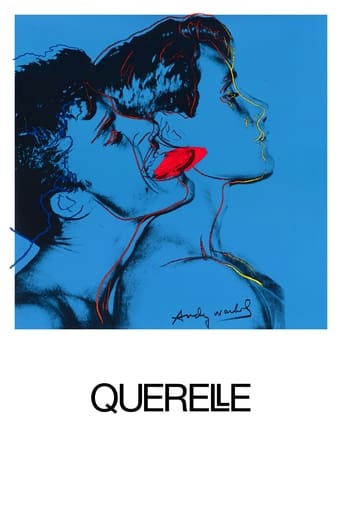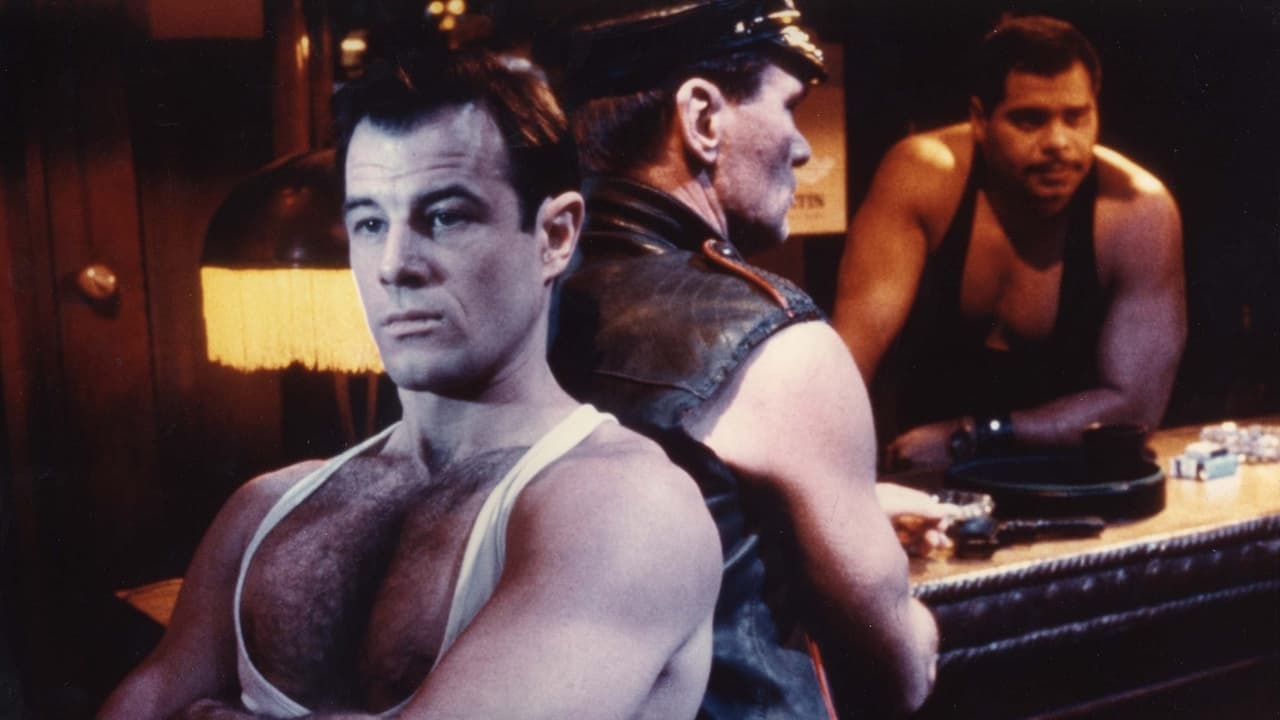semiotechlab-658-95444
"Homosexuality is not a topic at all in this movie", Rainer Werner Fassbinder answered in his last interview to Dieter Schidor, "the topic is the identity of everyone and how he gets it" (Robert Fischer, Fassbinder Über Fassbinder, Berlin 2004, p. 621). Querelle, therefore, depicts an Utopian new world, the word "Utopian" having its proper sense, since: "the Brest, as described by Genet, it a totally invented one, it does not exist at all, except perhaps in a bar in Texas" (Fassbinder, Loc. Cit., p. 619). In "Der Bauer Von Babylon", directed by Schidor - a film that, broadcast only once by the German TV, should be put as a special on a new edition of "Querelle"! -, Fassbinder added that, for the first time in his career, he filmed the whole movie in the studio. Fassbinder's art director and Oscar-winner Rolf Zehetbauer had crated a wholly artificial and artistic environment, a ship-like island with the bar in the center. The question why Fassbinder did not decide for any real landscape, he answered: "Because every real environment has something holy". It turns out that what is holy is not holy because it is untouched or untouchable, but it is holy because it bears traces of others who have left them in this particular place, building, table (so-to-say relics, as in the Catholic church). Hence, in a last consequence of Fassbinder's idea, if you choose any establishment to open your set, it always also transports the memories of all those who had been there before. If you walk through the alleys of Vienna - auteur and Nobelpreis-nominee Heimito Von Doderer remarked -, you breathe the smell of the centuries that are in the walls and under the streets. (In this way, metaphysics of everyday-life is born.) Which place you ever choose for your film, it has this "inherited defect" of been metaphysically immersed. The holy is that which bears the traces and therefore will never be yours alone, yet you will never be alone either, if you chose to reside in such places. On the other side, the profane is the untouched, it is profane because it does not bear any traces and thus will not connect you and the centuries past into a "holy" cosmos of memories which only establish you as a part of history, the common history namely of you and the place of your destination. Therefore, it does not astonish that all apocalyptic scenes in Fassbinder's work (e.g. the 14th part of "Berlin Alexanderplatz") are places, where the traces (signs by their very nature) come back to live like it is said to be happen on doomsday. For his "Epilog" to "Alexanderplatz", Fassbinder even had a gigantic cemetery constructed on the set in Geiselgasteig, where the graves open after Biberkopf enters this street, known to him well from his former life, but whose traces he never had seen before. Now they manifest themselves and dance a dance macabre with him as their center.
Cristian
"Querelle",which was last work of Rainer, was my first Fassbinder's experience. I think many times before see it, because I didn't know if "Querelle" was the correct film to begin to understand the work of an artist like Fassbinder. But, i decided... and i read a Lot of critics that tell that was a bad movie and a bad work of Fassbinder... i think just the opposite. Fassbinder's "Querelle" is one of the best movies that i have ever seen with this delicate topic of homosexuality.Fassbinder's "Querelle", based in the novel of the same name by Genet, told us the story of Querelle, a sailor who is going to live an unpleasant conflict among him and the people who surrounds him. Is a tale of sexuality and murder. Fassbinder's "Querelle" is an important anlization of the man's decadence. A man that is able to murder, to sell his best friend, to be a real monster. But Querelle is a man, and at the same time is a selfish monster... like much of us. The movie is too an analization of the masculine thing, and is important have clear that Fassbinder's "Querelle" is not a gay film at all... is the recognition of different ways to love.I have not seen much of Fassbinder (I hope that my next film, that i want see: "The Marriage of Maria Braun", catch me like this one) but this work with poetic force is one of the most important looks (As i said before) to the human decadence (With "Salò o le 120 giornate di Sodoma" and "Dogville"). I hope that people that has not still seen it don't be allowed to guide of much of the bad critics. Just see it... and tell us the things that you think. For me, is a real masterpiece.*Sorry for the mistakes... well, if there any.
edthewalleyedhyena
Perhaps 'Querelle' is a film that demands a more cultured and broad-minded viewer than I have proved myself to be, or perhaps it is pure enigmatic, overwrought drivel. I will likely never know the absolute answer to that, but I am willing to bet that past and future viewers will fall into these two groups: Those who feel that unclear character motivations, loosely constructed plot-structure and melodramatically poetic theatrics bespeak a larger sentiment, one not blatantly stated in this film; And the second group, who will leave this viewing experience raising their eye-brows in confusion, and possibly having a good laugh.This film, though wordy, probably operates most effectively in its nonverbal trappings. The sets have a bourgeois richness that is almost tactile, the direction of movement is staged and coordinated like dance in some scenes, and the lighting is one of the best uses of expressionism out side of the American film noir idiom I've ever seen.The script is an abstract exploration of people's motivations, specifically as they relate to the more carnal side of love, and there is also an underlying, equally abstract, message about the methods and means of self-exploration. All of this is told from the unique perspective of a naive, amoral young man who is, at the time that this film is set, exploring and learning about himself largely through acts of violence, sex and betrayal. Brad Davis' acting in the lead role is a strange mixture of stoic detach and reined-in anger/passion and I can not begin to describe it to someone who has not seen the film.This film, in my opinion, can not escape the onus of its "high camp factor", One gets the feeling that this is the stuff that John Waters may have cackled at in his formative years. This is not to say it's without artistic merit; it will make a glutton of your eyes with its decadent colours and rich set dressings. Chances are you will love it, or you will laugh at it, but you will surely remember having seen it.
ocaastro
Well it proves that Fassbinder was capable of making masterpieces and dogs. And that the dogs could occur very late in his career as well.Fassbinder's first blunder was selecting a story by Jean Genet whom I think only wrote while he was drunk. The story line is ham fisted and terribly contrived. I sat through the entire film hoping it would finally demonstrate some greatness but it remained consistently awful. After seeing more of his films including "Lola" and "The Marriage of Maria Braun" which were superb films I know Fassbinder is a great director who is capable of serious mistakes. I used to think it was his drug habit that screwed up his reasoning but when he put his mind to it he could stay sober for long periods of time. I think he just wanted to give the finger from time to time to the middle class.


 AD
AD



